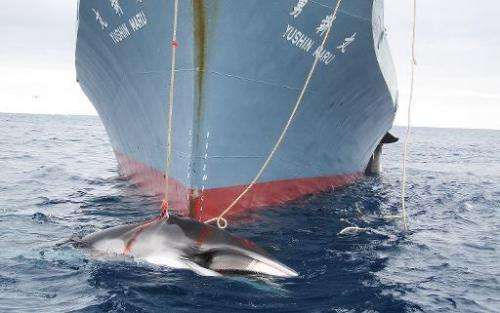Japan's new whaling plan will prove hunt is science: negotiator

A two-thirds cut in Japan's Antarctic whaling quota announced this month should be enough to prove that the hunt is for genuine scientific purposes, the country's chief negotiator said Wednesday.
Joji Morishita said the world's anti-whaling nations should compromise and recognise that Japan is trying to meet them halfway after a ruling by the International Court of Justice banning the hunt.
"Hopefully this research plan would trigger or send some message (to international opponents) because we have accepted the ICJ judgement in our research plan," Morishita told foreign journalists.
In March the ICJ—the highest court of the United Nations—ruled that Tokyo was abusing a scientific exemption set out in the 1986 moratorium on whaling, and was carrying out a commercial hunt under a veneer of research.
Japan cancelled its 2014-15 Antarctic mission after the ruling, but said it intends to resume "research whaling" in 2015-16.
Now, in a new plan submitted to the International Whaling Commission (IWC) and its Scientific Committee, Japan has set an annual target of 333 minke whales, down from some 900 under the previous programme.
Tokyo also defined the research period as 12 years from fiscal 2015 in response to the court's criticism of the programme's open-ended nature.

In addition, Japanese whalers will employ more non-lethal methods, including sighting surveys and biopsy sampling of skin tissue, while the participation of foreign scientists will be encouraged.
Deadlocked
"If the IWC is to survive as a conservation and management international organisation, there should be a new paradigm. First we have to agree to disagree," said Morishita.
The long-running but deadlocked discussion of "black or white, zero tolerance" at the IWC has to change, he said.
"We are happy to talk about conservation or recovery of depleting species or endangered species... we are happy to talk about non-lethal methods" as long as "sustainable utilisation" is also on the table for discussion, he said.
Japan killed 251 minke whales in the Antarctic in the 2013-14 season and 103 the previous year, far below its target because of direct action by conservationist group Sea Shepherd.
Tokyo also conducts hunts in the name of science in the Northwest Pacific, where it killed 132 whales in 2013, and off the Japanese coast, where it caught 92.
The IWC agreed this year to tighten scrutiny of Atlantic hunts, but rejected a bid to expand protection in the South Atlantic, as it struggles to balance traditional hunting claims with conservation.
Despite widespread international opprobrium, Japan has continued to hunt whales using the scientific exemption, although it makes no secret of the fact that the meat from the creatures caught by taxpayer-funded ships ends up on dinner tables.
But it finds unpalatable the idea of quitting the IWC, fearing it would send a message that Tokyo does not respect international rules.
Whale meat in Japan long ago ceased to be a regular feature of most diets, and surveys show that most people have only rarely, if ever, eaten it.
However the vehemence of the anti-whaling campaign has emboldened supporters, who charge nations like Australia with cultural imperialism. They point to the consumption of huge numbers of cows, pigs and sheep there.
© 2014 AFP



















